#but better late than never :D
Explore tagged Tumblr posts
Text

A late happy birthday to my favorite grumpy captain
#one piece#one piece art#one piece fanart#op#Trafalgar law#Trafalgar law art#trafalgar law fanart#Trafalgar d. water law#surgeon of death#ロー誕生祭2024#art#better late than never
638 notes
·
View notes
Text




Yoongi's genius producing and writing skills conveys extremely personal experiences through few and carefully selected words.✍️ To celebrate his birthday, the team dives deep into their own experiences with a small sample of SUGA's lyrical tapestry. 🎵💜
Which lyrics do you connect with most? Let us know!
#31stSpringwithSUGA #HappyBirthdaySUGA #LongLiveKingAgustD
#240309#yoongi#suga#min yoongi#agust d#birthday project#happy birthday yoongi#sorry this is very late but better late than never#bts#bangtan#lyrical genius yoongi
123 notes
·
View notes
Text

and John gets a cute sweater too 💙
#somebody requested john about 6 months ago I think ... well here he is :D#better late than never haha#john egbert#homestuck#homestuck fanart#homestuck art#beta kids#sweaters#my art
333 notes
·
View notes
Text







some splat art fights from this year !! bonus

Characters belong to:
@brella-boi 🦑 @emcar555 @sasseraph 🦑 Sweetpeafursuits 🦑 @icysarts Crumbum2074 🦑 exiled-serenity @natypinkns
#my art#i went off tumblrs linked on artfight pages so if anyone didnt get @d but has an acc somewhere / if i linked the wrong one thats why gdhgkd#ik its been over a month since af ended now but uh better late than never ??
100 notes
·
View notes
Photo

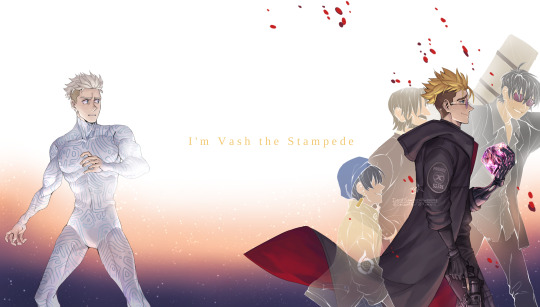
I’ll keep coming back o7 Trigun stampede. Absolutely floored by this show and all the heart and effort put into it. Its incredibly and full of love. I’m so excited to see what Studio Orange does with the rest of the series! I was really proud of this one, so I’m going to include more zoom shots beneath the cut!! -NO ROMANCE INCLUDED-

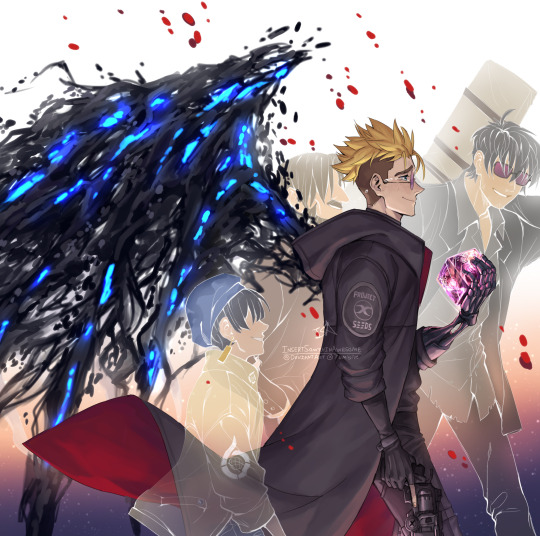

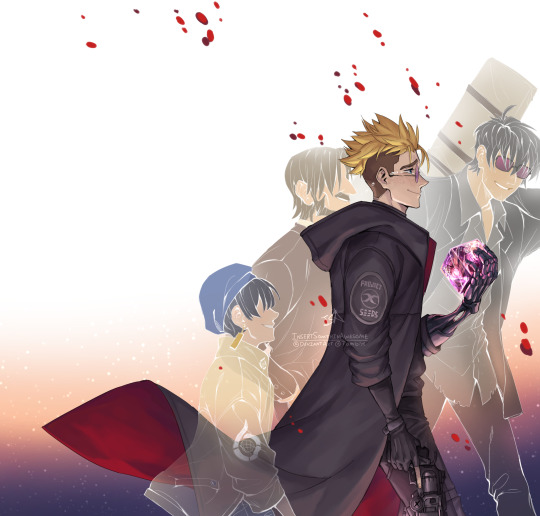
#Trigun Stampede#Trigun Stampede Spoilers#Trigun Stampede Episode 12#Vash the Stampede#Millions Knives#Roberto de Niro#Meryl Stryfe#Nicholas D Wolfwood#meryl trigun stampede#vash trigun stampede#roberto trigun stampede#wolfwood trigun stampede#knives trigun stampede#Isa's fanart#insertsomthinawesome#April2023#ITS DONE!!!#FOREVER LATER AND I FINALLY GET MY EPISODE 12 ART COMPLETED xD#WHOOOO#Better late than never ey? xD#This was fun and funky to work on#Hate Knives wing.#Drawing that was so frustrating xD#I don't think i went about it in the smartest way SDLFKJSDLGJSDG Something to hopefully learn from for next time xD#vash's wing is just.... slapping lines dots and vague forms onto a canvas and squinting#SDLFJSLDGJSDGSDsdg
749 notes
·
View notes
Text

Got to start the year off right <3
#I like the idea that they just get champagne drunk at home and just end up sloppy making out instead of going to a party idk idk#sorry I'm a week late :' D better now than never!#and wanted to do at least one cute holiday thing.....#(tho I may have some very late holiday requests in my inbox for later.. woopsss)#guriten#naoki urasawa's monster#kenzo tenma#wolfgang grimmer
26 notes
·
View notes
Text

Minthe
[3/31] Happy belated anniversary ★
Greek Gods AU by @help-im-a-gay-fish
Dream & Nightmare by jokublog
#zu art#comic#greek gods au#dream!sans#nightmare!sans#passive!nightmare#persephone!dream#hades!nightmare#minthe!shyren#shyren#shattered dream#undertale#undertale au#utmv#(( not canon unless Gayfish says otherwise ))#better late than never ///#Gayfish told me about Minthe back in September and I asked her permission to draw it... thank you for your patience!! :'D#originally Minthe should be more rude with Persephone since Hades left her for his wife; but toxic behavior (singing xp) works as well? =)#heheh I love me some jealous/vindictive Dream :)#upd OH my GOD I just realized I wrote 'Dream' where this name is not used at all! XD#but it's alright with Hades calling Persephone his 'dream' isn't it? ;D
781 notes
·
View notes
Text




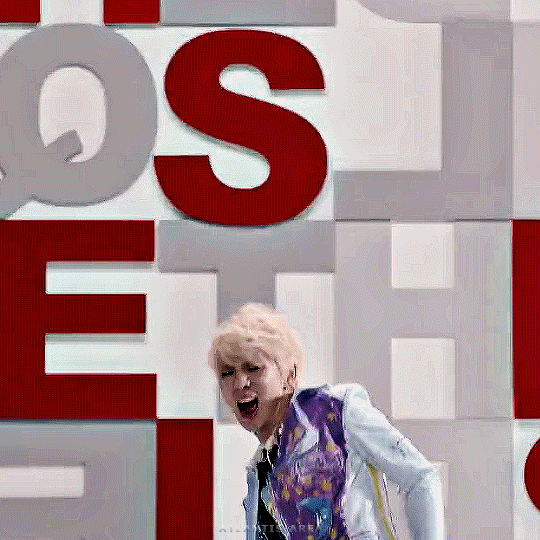


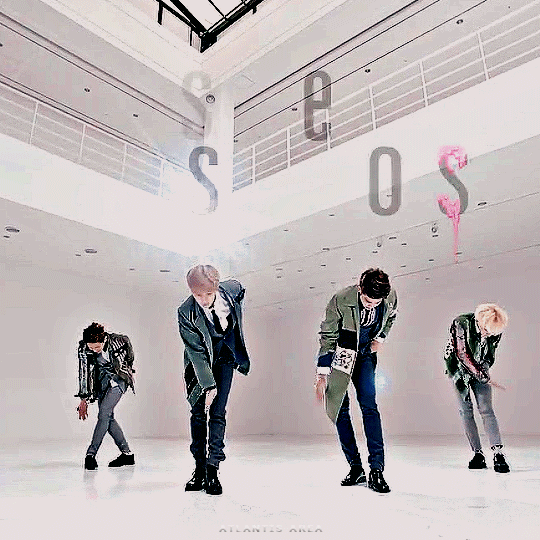
SHINee - Why So Serious? (2013) 11th anniversary
#SHINee#Onew#Minho#Taemin#Jonghyun#Key#Why So Serious?#giffedbyme#era: misconceptions of me#analook#userbexrex#skyehi#dailyshinee#kpopccc#malegroupsnet#ultkpopnetwork#smsource#dailybg#Lee Jinki#Kim Jonghyun#Kim Kibum#Choi Minho#Lee Taemin#2013#A bit late but better late than never#Was thinking of how much filter they used to use in the older videos#I tried to remove some of it#And sorry for the noise in some of them :D#Loved this even though Bling wasn't there#Probably this was the starting point for Taemin's solo career
89 notes
·
View notes
Text
Your best american girl by mitski vashwood animatic save me
(I finally digitised that sketchy storyboard, it starts a bit slow but i swear its not a black screen the whole time)
#this got hidden from tags and notifications when i posted it yesterday so im reposting it and testing my luck#i actually made this a week or two ago bur better late than never#trigun#trigun fanart#vash the stampede#nicholas d. wolfwood#vashwood#my art
25 notes
·
View notes
Text
Appreciative: May 32nd Prompt for @calaisreno
I have arrived, at last, to the end of my May prompts, this being the one for the 32nd of May, a day I decreed to exist so that I could add one last prompt of my own for myself, in honor of @calaisreno,😘 and the magnificent, awesome festival they brought into being with the May writerly shenanigans! So much creativity unleashed, all at the invitation of one very special person. 🤗 As you may have guessed from the title, the word for my own personal May 32nd 🙃 is: appreciative.
.................................................. This last chapter and the previous ones are here at ao3. Program Note: In the penultimate chapter posted at ao3, I added a note saying that I've decided to take these thematic seat-of-the-pants daily prompt responses and (fingers crossed) turn them into a real story. It will take a while, as it needs to then have, like -- AN ACTUAL PLOT -- but now I'm curious about all the ins and outs of how this premise I've been winging might work 🙃 -- of John figuring out that Sherlock is alive and strong-arming Mycroft into allowing John to secretly shadow him as protection -- so I'll try to figure it out! tldr; one of these days, look out for take 2 of my May 2024 prompts as a proper fic of its own: Threading a Shadow through the Eye of the Storm :-) ................................................. Warning: This ended up being 3x as long as any daily prompt chapter has a right to be . . . ................................................. Sherlock slips through the jetliner’s door at the last possible moment, very nearly missing his flight from Zagreb to Split. Feeling skittish after suspecting that he was being followed, he’d chosen to advance his departure by one day, erring on the side of caution that it was time to move on. His concern had been sparked after a bank visit to obtain funds to support his travels in Croatia; after moving down the steep set of stairs into the crowd of bodies milling about Jelacic Square, he had registered some sort of movement in his peripheral vision, giving rise to a judgment that he was being tailed. An impression of an instant was of dubious value for making decisions, but turning around for a closer look would have negated any slight advantage he might have gained.
He had disappeared behind a horse-drawn carriage, slipped into an alley and swiftly turned the corner, placing himself at the back of a cafe next to the rubbish bins. He’d made quick work of switching out of his navy blazer and forest green button-down shirt for the precautionary items in his briefcase: a white and red striped athletic shirt, a camo patterned bucket hat, and a worn gray rucksack. He binned the briefcase and his original clothes, and melted back into the crowd, reasonably certain that his wardrobe change undercut any efforts to resume tracking him at a distance.
Later that evening, he’d called the hotel and made a false arrangement to extend his stay for a week, attempting to wrong-foot any unwelcome players he may have attracted. He had purchased a new ticket on a different carrier using his Norwegian alias, and was reassured that, at least for now, he had neutralized any threat. He’d been on the road for so long, however, that he'd lost any sense of whether such actions were evidence that he was executing sterling tradecraft, or if he was seeing shadows refracted through a prism of paranoia.
An hour later, he arrives in Split without incident, and makes his way briskly toward the arrivals hall, stopping momentarily to rotate in a circle until he spies signage for the shuttle to Trogir, a city of 10,000 or so, a short distance away. He’ll be housed there for a few days – or at least until he determines whether or not there is more intelligence to be had in Croatia – before he boards the train that will carry him to Sarajevo for a similar stop, and then on to Belgrade and the risks it poses.
His fellow riders on the shuttle appear to be innocuous – locals returning from holidays or shopping trips, visitors touring the Dalmatian coast, house cleaners and sales clerks and restaurant staff on their way home after a day’s work in the city. As he leaves the transport, his anxiety is goading him to move quickly, but he forces himself to approximate a meandering gait, so as to appear innocuous himself.
He completes a circuitous route to end up nearly where he began, making his way to the DHL baggage station to retrieve a package holding the address and keys for the safe house, along with a miscellany of other items: colored brochures, bulky printouts, grainy photos. It’s been some time since he’s had a report from home; he doubts that there will be anything about London, and a quick glance tells him that his supposition is correct. He is never sure whether or not the lack of content is a good thing or a bad thing. Hearing nothing, were he to admit it to himself, is probably the better option, since it keeps him from having to battle the misery that arises when confronted with how long the tally of days marking the presence of his absence extends.
By the time he's located his lodging, dusk is beginning to close off the day; he opens the door to a one-bedroom apartment in a small building that is currently unoccupied. It's a relief to have a door to lock behind him, to be enclosed within four walls where he can begin to dial down his hyper-awareness of his surroundings.
The place contains nondescript chairs, a dining table with a stained surface that has seen better days, and lamps with dusty shades, but it seems comfortable enough. His needs are few, pared back to essentials – security and quiet being the most important among them. He leaves the lights switched off, and walks out onto the small balcony, brushing away the pollen that covers the wooden chair, which he uses as a front-row seat as the sun sets over the sea, a silent and solitary figure who becomes less and less visible as darkness first enshadows him, and then fully cloaks his presence.
He's worn-out, through and through, his emotional being as much as his physical state; he feels as if his nervous system is made of cast iron filings, heavy and tending toward rust, a corrosive scraping of his soul. He tries to shake off his turn into a viscerally maudlin state and to keep any further negative waves at bay by putting himself into motion, rising up from his seat and returning to the apartment in search of something to eat, if only for a distraction. He supposes it may be too much to hope that there is food waiting there for him; he regrets having made such haste to get to this new phase of his mission. Perhaps he’ll find some overlooked cartons of one sort or another; after all, his contacts aren’t hoteliers, but busy agents in the field, tasked with many more matters than dancing attendance on him. He moves toward the kitchen, turning on a few table lamps along the way, and is pleasantly surprised to find that there are food parcels to unwrap.
He tears off a portion of lepinja, the local flatbread, which he has come to like very much. There is a carton of eggs, a bottle of olive oil, tins of sardines packed in coarse salt, and fresh lemons. Packages wrapped in wax paper turn out to be several kinds of cheese, and inside a carrier bag there is a container of jam made from plums and another from figs, and a trio of multi-hued jars of honey.
His flagging spirits lift slightly, and he mocks himself that a loaf of bread and the taste of plums he licks off his fingers has made the difference, as he can’t provide an objective rationale for how such a mundane circumstance has dispersed some of the inky clots lodged in his mind. He savors the reveal staged by the opening of the door of the refrigerator to see if there’s anything inside, and is pleased at what he finds: a crockery bowl of cooked pasta which looks to be sauced with truffles, prosciutto, grilled sausages, bottled milk, and orange soda. He closes the door and turns to the other end of the counter, where he is particularly appreciative to find a plate of phyllo pastry containing a surfeit of cherries, and a version of shortbread biscuits stamped with outlines of bees. He dips his already sticky fingers into the cherry pudding and licks them clean, and then bites into one of the biscuits, which explodes on his tongue with the simultaneous taste of pepper, cloves, and cinnamon, and then quickly gathers up the rest, biting into a second one. Mrs. Hudson couldn’t have done better, he thinks, with a wistful nod of approval, as a whisper of melancholy reaches out and wraps around him.
He brings the plate of biscuits and the milk to the table to inspect various items that have been placed there. The most obvious is a map of Southeastern Europe spread out across most of the surface, and next to it, a tidy pile of travel guides for Croatia and Serbia – he finds the idea of a travel guide to Serbia to be grimly humorous, given the peril that he is bound to encounter when he arrives there and tries to disrupt the organization he hopes to set on a path to destruction. He rolls his eyes, finding it doubtful that its pages of advice on local highlights will contain anything relevant to his tasks . . . but then quickly reverses himself and thinks again: information of another kind may be exactly what he finds has been added. He’ll look at it more closely later, and sets it out of sight for now on the empty chair he’s standing next to.
He opens the cover of a book entitled Omis: The City of Pirates, produced by the city's board of tourism, and pulls out a chair to page through it, losing himself in another world for a few moments, adrift in the gulf of Venice in the twelfth century, having set sail from the former pirate town, aboard a medieval corsair preying on Adriatic shipping, which slips surreptitiously into one of the multitude of small coves and inlets that form a jagged saw-toothed edge along the Dalmatian coast.
His pleasure turns to delight when he puts the book aside to find a reprinted volume of A General History of the Robberies and Murders of the most notorious Pyrates from 1724, and he luxuriates in the indulgence of re-visiting tales about Blackbeard and Calico Jack. When he finds to his chagrin that he has eaten all of the biscuits, he decides it is time for something approximating a proper meal, or at least as proper as it can be, with himself leaning against the counter, as he’s not inclined to set up a place setting for one, for reasons that are unnecessary for him to devote attention to excavating.
His tabletop search later turns up one more item: a dvd set of an American historical adventure series, Black Sails. He remembers watching most of the first season at 221B with John – in the time before he’d abruptly had to make his exit from London. The totality of his haul of riches here reminds him of the safe house in Vienna, where he’d found a similar cluster of goods seemingly tailored to his tastes. Sherlock thinks acerbically that big brother must be experiencing prickings of guilt about his little brother's odyssey, and therefore has been supplying agents with a tip list. He finds it hard to credit, to be honest. It's certainly uncharacteristic for Mycroft to indulge him so, but perhaps he is becoming sentimental as he ages, or perhaps believes he needs to balance the books given the hazards that Sherlock is currently facing. He remembers that the safe house in Vienna had been stocked with a dvd set entitled Good Omens, which he’d sheepishly welcomed as an auspicious portent, despite knowing that such flights of fancy are nonsensical. That the current option on offer is Black Sails, is, he acknowledges, a reasonable augury of what lies ahead once he boards the train that will take him across the border from Croatia into Serbia.
For now, he feels fleetingly cared for and content, a rare state of existence in the two years and more since he has been away from London. A short while later, he puts the first disc into the player, and lies down on the sofa with a cushion wedged under his head; within minutes he falls into a deep sleep that lasts for seventeen hours.
When he awakens, it’s to a workshop in his mind palace, where he finds himself sharpening a steel bar capable of taking the brunt of a flinty determination to spark an endgame to his Moriartian exile. As he leaves the workroom to wander through the corridors, he opens the door to the tower that represents the last fortress to be breached. He doesn’t know if his chances of survival would benefit from an effort to be optimistic, rather than remaining resolutely realistic, but he’s dubious that he will be able to conjure up a positive vision of the future if he tries, without devolving into a spectre at the feast, and decides against making the effort.
He studies the Serbian guidebook with fierce attention – it is indeed rife with coded information – until he thinks it’s been shorn of all the surplus value that it contains. As dusk approaches, he realizes that he’s been sitting in one position from his awakening in the early hours of the morning until now; his muscles ache, and so does his head. A restlessness sweeps over him, and he decides there’s no more to be done at present; he’ll be waiting at least another day or two to rendezvous with sources who can update his earlier forays through Stockholm, Copenhagen, Malmo, and Gothenburg, the power base of one of the most dangerous of the arms of the Serbian mafia, built on a foundation from the mass immigration of Yugoslavian guest-workers to Sweden in the 1970s. Buttressed by the Yugoslavian secret services -- who made use of the expat criminal outfits as informants and assassins, providing them with weapons and legal protection -- the gangsters had grown to be formidably wealthy. The horizontal sturcture of the organizations have given Sherlock a great deal of trouble in bringing the personnel into the light, one of the reasons that he has been gone so much longer from London than he had ever imagined. Moriarty the man could well have been the god of chaos, but Moriarty, the institution, was a model of stealth order.
He decides to take a breather and to play tourist for the evening and thumbs a ride into the city, using the opportunity in conversing with the driver to re-acquaint himself with Lukas Sigerson’s accent and demeanor. By the time his friendly volunteer transport service has dropped him off near the city center, he’s realigned his presentation of self -- despite lacking enough of the bearded scruff to be completely in character, and the fact of his hair currently being a russet-tinged shade of Venetian blonde -- but he can make it work for his persona . . . he thinks. The lighter locks may lend themselves to being expected to be inhabiting a more gregarious disposition, which may be an insurmountable hurdle.
He's intrigued by what he sees before him as he makes his way further into the city center, the extensive Roman garrisoned fortress and monumental-scale palace built in the late third century for the emperor Diocletian to inhabit in a splendorous retirement, and even ever after, as his imperial remains were contained within the custom-built mausoleum. As he strolls around the perimeter, examining the walls, he drifts in and out of different tour groups being conducted in Croatian, English, Japanese, German, and Italian, hearing how several hundred years after Diocletian’s death and the fall of Rome, townspeople elsewhere in the region fled from invaders who had razed their city, seeking out the safety of the empty palace, where they had re-constituted their lives, incorporating their houses and workplaces within the impregnable palace walls and the cavernous barrel-vaulted cellar. In doing so, they had seeded the emergence of the city that now exists, and set the conditions for the continual presence of local people living and working within its precincts on up until the present-day, several hundred buildings, with several thousand people. Sherlock hears snatches of tales and questions and answers, including a 20th century description of the palace as “the most serviceable ruin in the world.”
He chooses to enter the palace compound itself from the east side, through the walls of the so-called Silver gate. He walks lightly down the pathway that takes him to the round vestibule that served as the first section for the corridor leading to the emperor’s apartments, and stands quietly, hands clasped behind his back, imagining the reverberations that music played within its circular wall would generate. He gazes up through the oculus at a waning crescent moon, acutely aware of the intangible stretching of earth connected with sky. As he wanders the compound, walking across stone streets gleaming from the passage of uncountable numbers of feet from ancient times until the present, he makes a game of deducing the palace's transformations, feeling rather smug when he reads on a plaque that his estimate that the emperor’s body had been jettisoned by later inhabitants to a place or places unknown, and his mausoleum repurposed as a Christian church is correct. He nods approvingly at another informational plaque that sardonically conveys the historical fact that the church became a cathedral named in honor of St. Domnius, one of the Christian spiritual leaders that Diocletian had persecuted and executed.
He wanders without purpose through the labyrinth of narrow passages and hidden courtyards, occasionally noticing someone looking out from higher up, or reeling in the washing hung out in lines above the streets. He wonders idly at the gamut of emotions that have restlessly circulated through the formal halls and the private corners, allowing himself to lower his threat level, determinedly eschewing his usual practice of straining his ears to identify hints of adversaries who seek to thwart him. He is rounding a corner when he hears strains of jazz music reverberating against the walls, a silky contralto whose words sing of wanting something cool, off to the right somewhere a bit further beyond. He decides to allow the music to pull him toward its source, and the vibrato leads him to a door with a sign that announces that what lies within is Marvlvs Library Jazz Bar.
“And what might a library jazz bar be?” he muses, peering closer in the shadowy space at the explanatory plaque on the wall, which says:
"You are standing outside where once the home of Marko Marulic (1450-1524) was located, a man whom contemporaries styled as the Christian Virgil, and who later came to be known as the 'Dante of Croatian literature.' Among his many works was the epic poem Judita (1501), based on the Book of Judith.”
He steps across the threshold, after first giving way to a cat who darts around his ankles ahead of him, to see what he'll discover. The space is of a piece with the rest of the palace: the contemporary layout is built atop the ancient stone floor, and incorporates the original graceful arches, as well as a wooden beamed ceiling and other touches that are likely five centuries old, from the time Marulic was held to have lived here. Starting near the entrance, books are shelved everywhere one looks. As Sherlock walks alongside the rows of neatly lined-up titles, he discerns an organizational logic, although not one based on alphabetization or time period. What stands out for him at first is how the subject matter moves from the physical world, to the biological world, and to the social world, moving then into representations and culture, from lies to truths, and from hearts to minds.
The bar is relatively empty at this late hour of a week-day evening, with only a few pairs of scattered patrons, and a lone bartender towards the back, so he commandeers a generously sized table intended for a group, that is placed beneath a massive painting of "Saint Jerome in His Study" – he is surely seated in the only bar on the planet which features a depiction of the patron saint of translators, encyclopedists, and librarians. He is charmed to find that the menu is itself a multi-paged book, filled with small stories, quotations, and poems woven in between the items listed on offer. Sherlock returns to the menu’s prologue, which he had skipped initially; the owner, it appears, is himself a poet: in fact in his introductory comments he remarks that he considers himself “to be married to his poetry,” and Sherlock feels a flicker of satisfaction at the second-hand encounter with a kindred spirit.
In keeping with the literary rationale of the bar, Sherlock has retrieved some volumes to skim, chosen from the nineteenth century: Bees: Their Habits, Management, and Treatment by the Reverend J.G. Wood; a second edition of Samuel Bagster’s The Management of Bees, with a description of the ‘Ladies Safety Hive’; and Thomas Nutt, Humanity to Honey Bees: or Practical Directions for the Management of honey-bees upon an improved and humane plan by which the lives of bees may be preserved, and abundance of honey of a superior quality may be obtained. He also has brought with him a mid-twentieth century volume with an enticing cover: H.J. Wadey, THE BEHAVIOUR OF BEES – and of bee-keepers. He considers it to be unlikely that he’ll eventually realize his dream of settling somewhere close to the sea and becoming a keeper of bees himself. But surely there is no harm in imagining that it might be so for a few hours.
He loses track of time as he immerses himself in his haul, until he senses reverberations from a tapping sound coming from the table, and then, startled, looks up, noticing the bartender he’d glimpsed after his entrance, standing beside him. He tamps down his threat response: it's merely a neutral personage, a pleasingly graceful young man whom he assesses to be twenty-six or twenty-seven, sporting a medieval phoenix tattoo, beautifully colored, that can be glimpsed from under the rolled-up sleeves of a soft, sky blue linen shirt tucked neatly into the snugly-fitted jeans that are at eye-level. When Sherlock raises his face, he sees a sun-kissed complexion and a deep set of dimples, dark brown eyes that match the color of the man's hair, which is cut longer at the crown and angled rakishly over his right eye, the tapered sides fading until they touch the open skin at the collar of his shirt. Although not a threat, Sherlock's pulse has yet to completely return to its baseline.
“You look like you’ll be thirsty soon,” the blue-and-brown speaker says teasingly, “if you’re not already, with how hard you’ve been going at your research. May I bring you something to eat or drink? We'll not be open very much longer, so it's now or never."
For some reason that escapes him at the moment, Sherlock can’t seem to summon up a vocal response, although this doesn’t seem to put off his visitor.
“Perhaps you’d like something regional, to soak in the aura of the place more deeply?”
Sherlock narrows his eyes. “If that’s a roundabout way of suggesting slivovitz, please, no thank you, please. I know for certain that I am not going to be in Croatia long enough to develop a taste for it.”
“Well, yes, it did cross my mind,” the bartender says with a cheeky smile that activates his captivating dimples. “But I’d like to stay on your good side. No, I was thinking of something that would pair well with your bee-keeping books.”
“And that would be?” Sherlock asks, his voice softening slightly, awarding the young man points for fine observational skills.
“Medenica,” the bartender says confidently. “A honey-based brandy. It is well-known in these parts as an excellent aperitif – to stimulate the appetite and open the digestive system – and, as it happens, as an excellent post-meal digestif as well. Which is not to say that it is not an excellent drink to have first thing in the morning, as an aid in ‘cleaning the body,’ although it is also true that it really is suitable for any time of the day, or night, for that matter, such as when alone, and perhaps needing some assistance in ensuring a restful sleep. So, you see, no matter what your state of being presently, it is a superb option.”
“Well,” Sherlock says dryly, “It seems as if the only possible answer is . . . yes. So, yes," he offers, with the slightest of smiles.
“Wonderful! Feel free to wave me off, but perhaps you’d like to join me at the bar, keep me company, while I prepare it for you? It will take a few more moments than how we typically serve it, as I’ll warm it before pouring. Oh, and I should introduce myself ," he says with a slight bow. "My name is Petar.”
Sherlock nods his head in response, and says primly, “I’m pleased to make your acquaintance, Petar. I’m Lukas.”
Once he’s seated at the counter, Sherlock finds that he is mesmerized by the thick, golden liquid sliding down the side of the glass, and then realizes that he’s lost track of whatever Petar has been saying, and tries to catch up. “I’m sorry, what was it that you asked?”
Peter laughs. “If you work with plants? Or if you are perhaps an entomologist?”
“Not presently,” Sherlock says. “Perhaps one day. My work is in the field of computer science.”
“And what is your area of expertise, Lukas?”
Sherlock looks at Petar skeptically. “You really want to know?”
“Really," he replies, his hand brushing against Sherlock's as he places the heavy, warmed glass in front of him.
Sherlock pulls up the relevant details from his background cover. “Computational intelligence. Fuzzy logic.” He takes a sip from his glass, and shakes his head in wonder at how good the honeyed brandy tastes. “My research entails trying to program computers to answer questions that can’t be solved in exact terms, with either a yes or a no, because the questions arise from processes entangled with highly complex, changing variables, that are open to chance.”
“Something like the weather,” Petar suggests, beginning his evening clean-up, drying glasses, and hanging them in the hanging overhead holder.
“That’s not a bad example,” Sherlock concedes. “My focus, however, is in using biological instances as a characteristic approach. Think about the survival of a species – that’s a problem that requires a solution. Natural selection doesn’t offer a yes or no answer; it inherently diversifies the possible range of solutions through mutations, which themselves are impacted by open-ended sets of variables.”
“And how is it that these interests have brought you to Split? Although I can make an argument that we live amongst fuzzy logic here," he chuckles, "So perhaps that answers itself."
“I was in Zagreb for a meeting of the Computational Intelligence Society, at a conference hosted by I triple E – the Institute of Electrical and Electronics Engineers.”
“And how is it that a computer man finds himself having traveled from technical proceedings to wandering about an ancient palace?” Petar asks.
Sherlock shrugs. “I’d never seen the Adriatic coast, and the thought of all that sun was appealing. Living in the northern latitudes inspires one to seek out occasions to escape the darkness." He sips thoughtfully, closing his eyes as the liquid moves from his mouth down his throat. “I have a question for you,” he offers. “The informational sign out front explains the reason for the library theme, as it is presumed to be the site of a lauded author. But how did the choice of jazz music come along with it?”
“That’s an easy one,” Petar replies. “The owner didn’t feel compelled to carry through the theme completely, as he thought late medieval, early modern music would be unlikely to draw crowds.”
“Fair enough,” Sherlock responds, and then tries some teasing of his own. “Working from the information in the menu, mightn’t a writer of moral and theological treatises feel compelled to haunt the premises, unamused by the rhythms of modern jazz permeating his home?"
“Well, the owner claims that Marulic wrote on a wide range of topics. For example," Petar says, with a wink, "I’ve heard it bandied about that he wrote glosses on the erotic poetry of Catullus.”
“Did he now?” Sherlock responds, an inviting lilt accompanying his words. "Do tell.”
Petar grins. “I’m sure we have a volume of Catullus’ poems at the ready if you give me a minute or two. In the meantime, would you like another drink?" and his smile broadens when Sherlock agrees. “My shift is almost over, as it’s nearing time for us to close. Would you mind waiting for me for a short time, with your bee books to keep you company, while I finish tidying and then lock up? After that, I can join you with a glass of Medenica as well, and we can chat at our leisure.”
Sherlock offers a small, lop-sided smile. “That sounds acceptable.”
“Well, then, Živjeli, to us!” Petar says, warmly. "The night has only just begun, and there are so many possibilities before us.”
......................................
@calaisreno @totallysilvergirl @friday411 @peanitbear @original-welovethebeekeeper
@helloliriels @a-victorian-girl @keirgreeneyes @starrla89 @naefelldaurk
@topsyturvy-turtely @lisbeth-kk @raina-at @jobooksncoffee @meetinginsamarra
@solarmama-plantsareneat @bluebellofbakerstreet @dragonnan @safedistancefrombeingsmart @jolieblack
@msladysmith @ninasnakie @riversong912 @dapetty
.............................................................................
#mayprompts2024#calaisreno#sherlock bits and bobs#may prompts 2024#johnlock#better late than never?#happy end of may#all you cool cats and kittens :-)#‘Another d-mn’d thick square fic!#always scribble#scribble#scribble! Eh! Mr. Gibbon?’
34 notes
·
View notes
Text

Happy Birthday to the stinky
#better late than never#my art#one piece#one piece fanart#one piece art#opfanart#trafalgar d water law#trafalgar law
113 notes
·
View notes
Text

Countdown to Christmas; Part 5- December 22 (3 Days left)
Surprise! Being done with this year’s art gifts for Christmas a week before the holidays I decided to make a little challenge and give you guys my own silly version of a Christmas calender featuring the K-crew and JO :3
The first time I've ever drawn Chelsea and omg she's precious :'D She's the star to her father's Christmas tree for day 5 :3
#chelsea the dog#häärijä#käärijä crew#better late than never drawing the precious doggo :'D#mine#my own art
72 notes
·
View notes
Text
day 6

#MY ART#i know im EXTREMELY late to the party but its better late than never :D#felt lazy#ULTRATOBER#ultrakill#streetcleaner#streetcleaner ultrakill#ultrakill streetcleaner#ultrakill fanart
94 notes
·
View notes
Text

Another linocut of the D&D LMnoP crew! 👀✨
Cast links + original linocut under the cut! ;P



Cast:
Pan Dyrektor (DM) - @jellybeandrawsthings
Corisander the Wizard - me! :D
Aiden the Folk Hero - @bratniadusza
Eirene the Rogue - @kindofkas
#linocut#d&d#dnd#dnd oc#dungeons and dragons#oc art#ocs#friends ocs#Pan Dyrektor the DM#Corisander the Wizard#Aiden the Folk Hero#Eirene the Rogue#my art#this is from months ago but hey better late than never!! :DD
15 notes
·
View notes
Link
Chapters: 46/? Fandom: 人渣反派自救系统 - 墨香铜臭 | The Scum Villain's Self-Saving System - Mòxiāng Tóngxiù Rating: Explicit Warnings: Creator Chose Not To Use Archive Warnings Relationships: Luo Binghe/Shen Yuan | Shen Qingqiu, Shen Jiu | Original Shen Qingqiu/Yue Qingyuan, Shen Jiu | Original Shen Qingqiu & Shen Yuan | Shen Qingqiu Characters: Shen Yuan | Shen Qingqiu, Luo Binghe, Shen Jiu | Original Shen Qingqiu, Yue Qingyuan, Ming Fan (Scum Villain), Ning Yingying Additional Tags: Transmigrator Shen Yuen | Shen Qingqiu, Oblivious Shen Yuan | Shen Qingqiu, Alternate Universe, Shen Jiu | Original Shen Qingqiu and Shen Yuan | Shen Qingqiu are Not the Same Person, Past Child Abuse, Bullying, Friends to Lovers, Where SY may or may not be related to SJ, Other Additional Tags to Be Added, Unreliable Narrator, Slow Burn, Canon-Typical Violence, Found Family, explicit tag for violence, Disciple Shen Yuan | Shen Qingqiu, Character Study Summary:
There is a boy digging a hole.
There should be nothing special about him. He is one of many children digging holes, each and every one eager to get a spot on Cang Qiong Mountain. At a distance, there was black hair and shabby clothes.
Yue Qingyuan could not look away from him.
-
In a world where they are the same age, Shen Yuan is going to try his very best to become the best friend of his favorite protagonist and prevent the blackening of Luo Binghe! Only, there is a problem.
Shen Yuan looks way too much like the scum villain himself, Shen Qingqiu.
17 notes
·
View notes
Text

a doodle for an anon on kofi ❣️🎉🌈thank you very very much ! ! ! !
98 notes
·
View notes